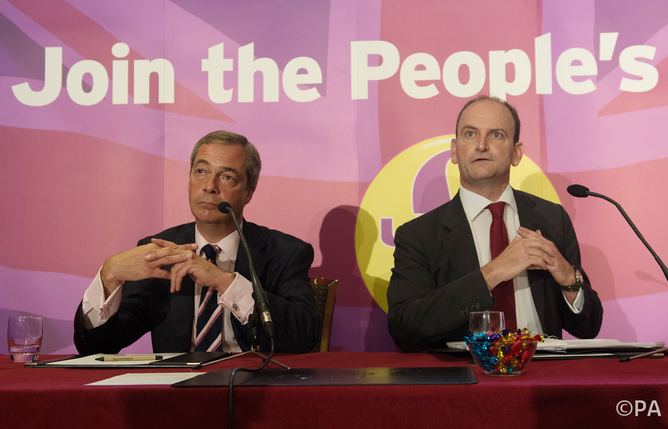All eyes on Tory eurosceptics as defection to UKIP forces fight that could shape next election

Douglas Carswell, the Conservative MP for Clacton, has dropped a bomb by announcing his defection to UKIP, and will fight a by-election to give his constituents the chance to pass judgement on the decision.
Carswell is a long-time eurosceptic and a vocal member of the Better Off Out campaign. He has a reputation for being something of a maverick who is quite happy to defy the Tory whips in parliament. There are a number of other eurosceptic Conservative MPs and councillors who must now be considering their positions.
It has been a good year electorally for UKIP, since it is the first party other than Labour and the Conservatives to come first in a national election – in this case for the European Parliament – since the Liberal landslide of 1906. The party also did very well in the local elections of 2013. Both successes are a measure of how UKIP has influenced the political climate. In a YouGov poll for the Sunday Times published on August 22, UKIP received 14% in voting intentions, almost twice as much as the Liberal Democrats.
And now Nigel Farage’s team has scored another coup. Carswell’s defection is not just a little local difficulty, it has far wider implications for the Conservatives’ campaign in the run-up to the general election next year.
To counter the UKIP threat, Conservative strategists have deployed the “wasted vote” argument. They make the point that UKIP cannot deliver an in-out referendum in 2017. In an interview for the BBC, Carswell said that this is disingenuous since he believes Conservative leaders really want to stay in the EU while at the same time giving the impression they want to leave, in order to keep their supporters onside.
This is in fact a re-run of Harold Wilson’s strategy in the referendum on membership of the European Economic Community in 1975. Labour was badly split on the issue at that time so Wilson promised a referendum in order to control the dissenters, but then announced at the last minute that the minor concessions he had won from the European Commission justified a vote to stay in. Carswell, along with a number of other Conservative supporters, clearly think this is what Cameron is up to and they don’t like it.
Clacton is a safe Conservative seat, with the party taking a 53% share of the 2010 election vote, compared with Labour’s 25%. UKIP did not fight the seat in that election but the party soundly trounced the Tories in the European Parliamentary elections this year. In Tendring, the European Parliamentary Constituency that includes Clacton, UKIP won 19,398 votes compared with the Tories 9,981.
One of the reasons for UKIP’s success is the connection Nigel Farage has made between immigration and membership of the EU. Britain cannot exclude economic migrants from the EU and now the British economy is recovering while the eurozone economy continues to flatline, this type of immigration is increasing.
Research we have been conducting at the University of Essex shows that UKIP is winning votes from people who are discontented by the performance of all three major parties in managing the economy.
Voters know the economy is recovering but they don’t feel the benefits themselves and so do not reward the government for a good performance. At the same time they are reluctant to support the Labour alternative on the grounds that the party was in charge when the economy crashed in 2008. As a result, some are opting for UKIP. With immigration and the economy high on the national agenda, the party has shrewdly moved on from being one-trick pony which only appears to talk about the EU.
It will be a hard fought by-election campaign but UKIP can win it, and if this happens it will completely derail the anti-UKIP strategy being pursued by the Conservatives. That in turn makes it less likely they can win the general election next year.
The Conversation - This article is co-published with LSE Blogs.

